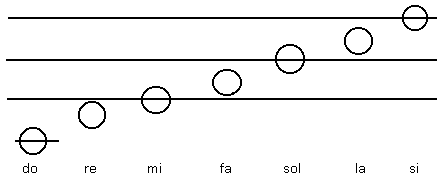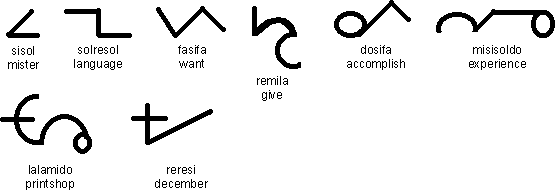Solresol language and stenographic script (original) (raw)
Solresol was invented by François Sudre (1787-1862), a musician, composer and music teacher. He started working on it in 1817 and continued until his death in 1862. His book about the language was published in 1866. He called the language la Langue musicale universelle (the international musical language), or Solrésol, which in Solresol means language, idiom, dialect, linguistics or philology.
Sudre hoped Solresol would be used to facilitate international communication and deliberately made the language simple, so it would be easy to learn, and unlike any natural language, to avoid giving an advantage to any particular group of people.
Solresol was the first artificial language to be taken seriously as an interlanguage. It is also the first and only musically-based interlanguage, or at least the only one to make any headway.
Sudre taught his language to two other musicians, Édouard Deldevez and Charles Larsonneur, and the trio toured France, Belgium and the UK to promote and demonstrate the language.
The French army and navy tried out the language as a way to transmit messages at a distance via bugle. This was not entirely successful.
Solresol has seven syllables based on the Western musical scale: do re mi fa sol la si, though you don't have to be familiar with music in order to learn it. The total number of Solresol words is 2,660: 7 words with one syllable; 49 with two syllables; 336 with three syllables and 2,268 with four syllables;
Many words in Solresol are grouped according to their first syllable.
- do = physical and moral properties of people, their intellectual faculties and qualities, and food, e.g. doredomi (body), domilafa (reason, sense), dofamisol (wisdom), dolamisi (to eat), dolasoldo (meat)
- re = things in the home, housework and family, e.g. redoredo (clothes), remifala (house, home), remisolla (room), resolmire (to sweep, broom), residosol (family)
- mi = actions and flaws, e.g. midosolfa (to complain), mifadore (character, nature), milamido (to talk nonsense), milarefa (to critcize)
- fa = country, travel, war and the navy, e.g. fadoremi (countryside), fadomido (mountain, hill), fadofasol (tree), famidomi (soldier), fasisolfa (road), fasidore (to travel)
- sol = fine arts and sciences, e.g. soldoremi (theatre), soldomido (opera), solsifasol (to invent, create), solsidofa (novel, story)
- la = industry and commerce, e.g. ladoremi (to manufacture, make, factory), ladomifa (workship, studio), larelado (accounting), lamiresol (trade)
- si = city, goverment and administration, e.g. sidoredo (city, town), sodofasi (market), siresire (politics).
Feminine words (for female beings) are indicated by accenting the final vowel of a word. In writing this can be indicated with an accent: domifado = man, domifadō = woman. Accenting the final vowel also indicates the plural.
Accenting different syllables is used to indicate the category of word. Accents are not normally indicated in writing, but can be added as a macron, acute or circumflex. When singing or playing Solresol on an instrument, accented syllables are given two beats.
- unaccented = verb, e.g. solremifa = to sing
- accented 1st syllable = abstract noun, e.g. sōlremifa = song
- accented 2nd syllable = agent/doer, e.g. solrēmifa = singer
- accented penultimate syllable = adjective, e.g. solremīfa = song-like
- accented final syllable = adverb (or feminine/plural), e.g. solremifā = singingly (tunefully); sisol = Mr - sisōl = Mrs; dore = I, me - dorē = we, us
Some words have an opposite of related meaning by reversing the syllables. For example:
- misol = well, good - solmi = wrong, evil
- fala = good, tasty - lafa = bad
- fasi = much, very - sifa = little, scarely
- solla = always - lasol = never
- solsi = to go up, climb - sisol = to descend
- solsifa = to laugh - fasisol = to cry
- simila = ease - lamisi = difficulty
- doladomi = to accept, consent - midolado = to refuse, reject
- dola = one, someone - lado = nothing, zero, nobody
- simi = good morning/afternoon, hello - misi = good evening/night
- dore = I, me, we - redo = my, mine
- dofa = you - fado = your
Tenses are indicated as follows:
- dodo = imperfect / pluperfect, e.g. dore dodo domilado (I was speaking / had spoken)
- rere = simple past, e.g. dore rere domilado (I spoke)
- mimi = future / future perfect, e.g. dore mimi domilado (I will speak / will have spoken)
- fafa = conditional / past conditional, e.g. dore fafa domilado (I would speak / would have spoken)
- solsol = imperative, e.g. solsol domilado (speak!)
- lala = present participle, e.g. lala domilado (speaking)
- sisi = past participle, e.g. sisi domilado (spoken)
Written forms of Solresol
- Latin alphabet: do, re,mi, fa, sol,la, si
- Latin alphabet without the vowels (except the o of sol to distinguish it from si): d, r,m, f, so,l, s
- As notes on a musical scale of just three lines:

- As numerals: 1 (do), 2 (re),3 (mi), 4 (fa), 5 (sol),6 (la), 7 (si)
- Using the Solresol stenographic script invented by Vincent Gajewski:

Solresol can also be represented by the seven colours of the rainbow, (red, orange, yellow, green, blue, indigo and violet), by manual signs, with different coloured flags, or by painting.
Sample words in the Solresol stenographic script

Double syllables are indicated with a line through them.
Sample text
Sire misolredo doredore famido re misolla, re famisol dosila re refasi. Dofa midomido midodosi dofasifa re domilafa, re falado fasolfa miladomi midodosi simisila.
Translation and recording by Simon Ager.
Translation
All human beings are born free and equal in dignity and rights. They are endowed with reason and conscience and should act towards one another in a spirit of brotherhood.
(Article 1 of the Universal Declaration of Human Rights)
Videos in and about Solresol
Information about Solresol | Phrases | Numbers | Family words
Links
Information about Solresol
http://en.wikipedia.org/wiki/Solresol
https://tmh.conlang.org/solresol/
https://sillylinguistics.com/solresol/
https://wiki.xxiivv.com/site/solresol.html
https://en.wikipedia.org/wiki/François_Sudre_(1787-1862)
https://fr.wikipedia.org/wiki/François_Sudre
http://www.labirintoermetico.com/12ArsCombinatoria/lingue_universali/Gajewski_B_Grammaire_du_SolReSol_Sudre.pdf
Solresol numbers
http://www.languagesandnumbers.com/how-to-count-in-solresol/en/solresol/
Other notation systems
Alchemical symbols,Blissymbolics, Graffiti,Shorthand,Solresol,Sutton SignWriting,Yi Jing Hexagrams
International Auxiliary Languages
Blissymbolics,Esperanto,Folkspraak,Glosa,Ido,Interglossa,Interlingua,Interlingue/Occidental,Interslavic, Lingua Franca Nova,Lojban,Novial,Romance Neolatino,Romániço,Slovio,Solresol,Uropi,Volapük
Page last modified: 06.09.24
[top]
You can support this site by Buying Me A Coffee, and if you like what you see on this page, you can use the buttons below to share it with people you know.
If you like this site and find it useful, you can support it by making a donation via PayPal or Patreon, or by contributing in other ways. Omniglot is how I make my living.
Note: all links on this site to Amazon.com


[top]

